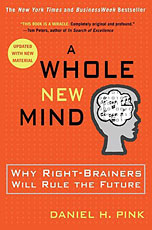"For (Madan) Kataria, humor is not a prerequisite for laughter. The goal of his clubs is 'thought-free' laughter. 'If you're laughing, you cannot think. That is the objective we achieve in meditation.' The meditative mind is the route to joyfulness. Joyfulness differs from happiness, Kataria says. Happiness is conditional; joyfulness is unconditional. 'When you depend on something else to make you laugh, the laughter doesn't belong to you. That's a conditional laugh. But in laughter clubs, the source of laughter is not outside the body; it is within us.' Kataria points out that children don't really grasp humor early in life, yet they laugh from the time they are infants. In fact, folklore has it that children laugh hundreds of times a day and adults barely a dozen. Yogic laughter in a group, he says, can help people go from the conditional happiness of adults to the unconditional joyfulness of children. 'I want to help people reclaim their childlike playfulness,' he tells me.
"Now, usually the mere hint that I need to pick up my inner child from the day care of my subconscious makes me roll my eyes and hide my wallet. But the science mostly backs up Kataria's claims about laughter's virtues. Laughter won't cure tuberculosis, but this odd human activity — emitting pulsating paroxysms of air and sound through our piehole — is undeniably good for us. For example, studies by Dr. Lee Berk of the Center for Neuroimmunology at the Loma Linda School of Medicine show that laughter can decrease stress hormones and boost the immune system. Robert Provine, a neuroscientist whose book Laughter: A Scientific Investigation offers a thorough account of the anthropology and biology of laughter, notes, 'The scientific record offers modest but growing support for the analgesic properties of humor and laughter.' What's more, laughter has aerobic benefits. It activates the cardiovascular system, increases the heart rate, and pumps more blood to internal organs. Provine reports that laugh researcher William Fry 'found that it took 10 minutes of rowing on his home exercise machine to reach the heart rate produced by one minute of hearty laughter.' Perhaps most important, laughter is a social activity — and the evidence is vast that people who have regular, satisfying connections to other people are healthier and happier. Laughter, says Provine, 'has more to do with relationships than jokes.' We rarely laugh alone. Yet, we often can't help but laugh when others begin to chuckle. Laughter is a form of nonverbal communication that conveys empathy. . . . Laughter clubs — which, like laughter itself, are always free — combine elements of four good things (yoga, meditation, aerobics, and social contact) into a fifth good thing.
"And that's why Kataria believes that the next frontier of laughter clubs is the place where stress runs most rampant: the workplace. 'Laughter can play a major role in reducing stress in the workplace,' he says. Kataria says that businesses believe that 'serious people are more responsible. That's not true. That's yesterday's news. Laughing people are more creative people. They are more productive people. People who laugh together can work together.' Companies such as Glaxo and Volvo have gotten the message and organized laughing clubs. And Steve Wilson, a Kataria disciple and self-described 'joyologist' in Ohio, is taking the message to corporate America. Says Kataria, 'There should be a laughing room at every company. If you can have a smoking room in a company, why not have a laughing room?'
"I doubt that IBM will set up a laughing room anytime soon (though there were probably those who doubted whether Fortune 500 execs would ever pay money to play with Legos). But it seems clear that in an age of abundance, laughter provides something the left brain cannot. More broadly, today a play ethic can strengthen and ennoble the work ethic. Games are teaching a variety of whole-minded lessons to a new generation of workers and have given rise to an industry that demands several of the key skills of the Conceptual Age. Humor represents many aspects of the sophisticated thinking required in automated and outsourced times. And just plain laughter can lead to joyfulness, which in turn can lead to greater creativity, productivity, and collaboration.
" 'The limited brain is a technology,' Kataria tells me after we've finished breakfast and the clock is edging toward noon. 'You do this, you get this. You do that, you get that. It's mathematics. Laughter I see as a divine mathematics. It doesn't make two plus two equal four. Two plus two can equal sixty-four.' Then he laughs."
